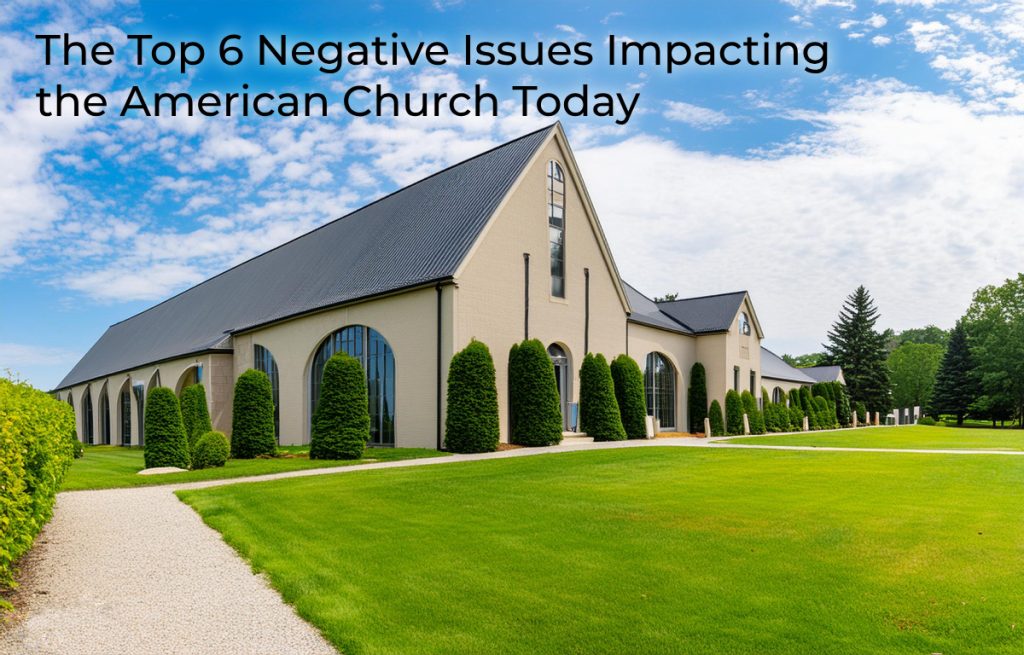
In the landscape of contemporary Christianity, the American Church grapples with a multitude of challenges that demand attention, reflection, and action. These challenges not only affect individual believers but also have far-reaching implications for the Church’s greater witness, mission, and impact on society. In other words, we as the worldwide body of Christ should be unified, wholly biblical, and operating as the Church did in the Book of Acts, but several things have plagued us not being able to do so.
As voices and opinions echo in theological discussions and digital spaces, it’s evident that the American Church confronts a series of pressing challenges. These debates and deliberations highlight the urgent need for a collective response to the issues that hinder our ability to embody the spirit and mission of the early Church. Some speculated issues by others I consider to be pretty well on target, while others seem to be way “down the list” of what I think are genuinely important.
Here are what I consider to be the top 6 negative issues affecting the American (or Western) Church in modern times.
Lack of Biblical Literacy
The first major issue is that of biblical illiteracy. People – even professing evangelical believers – simply don’t know the contents of the Bible, let alone follow it. This sad issue of biblical illiteracy within the American Church is pervasive and multifaceted, not to mention easy to fix. Access to Scripture has never been easier, with the many translations of the Bible still being the runaway bestselling book on planet Earth year after year. The Word of God is never more than a tap/click or two away, as well as Bible apps being available on any smartphone in First World countries, and excellent Bible websites like BibleGateway.com are at our fingertips. Therefore, we have no excuses for not reading and knowing the Bible.
Yet the depth of engagement and understanding of God’s Word among believers has waned. This deficiency is evident in various aspects of church life, from sermons that prioritize entertainment and self-help advice over exegesis to small group discussions that lack substantive engagement with biblical texts. Consequently, many Christians possess a superficial, kindergarten-level familiarity with Scripture, and sadly lack the foundational knowledge and theological depth needed to navigate most of life’s fundamental problems.

This erosion of biblical literacy has profound implications for the American Church’s spiritual health and witness. Without a solid grounding in God’s Word, believers are susceptible to doctrinal error, moral compromise, and spiritual stagnation. Most importantly, without a good understanding of the Bible, we fail to grasp who God said He is in Scripture. The sad fact is that most church-goers do not know who God is. Unlearned believers may possess a vague notion that “God is love” or a semi-erroneous idea that He is our “big Buddy in the sky,” when instead, we need to know that God is absolutely holy, wrathful, perfect, omniscient, omnipotent, omnipresent, eternal, immutable and unchanging, sovereign, loving, merciful, just, gracious, faithful, truthful, good, transcendent, immanent, creator, sustainer, righteous, and wise. He has total providence, meaning He is in complete control over every aspect of the Universe from beginning to end.
We also need to know what Scripture says about the nature of mankind in that it is entirely sinful and corrupted, therefore separated from God. But since God loves us, He made a way for us to be reconciled unto God by sending His perfect and sinless Son, Jesus Christ, to pay the penalty for our sins that we could never pay. Jesus literally and physically rose from the dead, and by trusting in Jesus and not our own works and deeds, we will receive eternal life.
Moreover, the absence of biblical literacy undermines the Church’s ability to engage effectively with contemporary issues, such as what to do about Critical Race Theory, social justice, the LGBTQ+ agenda, changing ethics, and cultural transformation. In a society increasingly characterized by compromise, moral relativism, and secular humanism, the American Church’s failure to prioritize biblical literacy leaves it vulnerable to the prevailing winds of culture, compromising its prophetic voice and transformative potential.
Lack of Biblical Authority
Churches in the U.S., Canada, and Europe also face the erosion of biblical authority as a foundational cornerstone of faith and practice. In a culture characterized by skepticism towards absolute truth and relativism, the authority of Scripture is increasingly called into question, both within and outside the Church.
The authority of Scripture is essential for the American Church’s spiritual vitality, doctrinal clarity, and moral integrity. Scripture itself asserts its divine origin and authority, declaring, “All Scripture is breathed out by God and profitable for teaching, for reproof, for correction, and for training in righteousness” [2 Timothy 3:16]. As the inspired and infallible Word of God, Scripture serves as the ultimate standard by which all beliefs, practices, and ethical decisions are to be evaluated.
However, in the face of cultural pressures and intellectual challenges, the authority of Scripture is often relativized, marginalized, or selectively interpreted to suit personal preferences or cultural norms. This erosion of biblical authority undermines the foundation of the Christian faith, leading to doctrinal confusion, moral compromise, and spiritual drift within the Church.
To address this issue, the American Church must reaffirm its commitment to the absolute authority and sufficiency of Scripture in all matters of faith and practice. This entails a robust defense of biblical inspiration, inerrancy, and interpretation, grounded in a firm conviction that Scripture is God’s revelation to humanity and the ultimate authority for believers. Moreover, it requires a willingness to submit to the authority of Scripture in obedience and humility, even when its teachings may challenge our preconceived notions or cultural sensibilities.
By upholding the authority of Scripture as the foundation of its faith and life, the American Church can resist the tide of secularism and relativism, remaining steadfast in its commitment to truth, righteousness, and the proclamation of the Gospel. As believers anchor themselves firmly in God’s Word, allowing it to shape their beliefs, attitudes, and actions, the American Church can fulfill its calling to be salt and light in a world desperately in need of God’s truth and grace.
No Fear of God, and a Lack of Understanding of His Sovereignty and Character
I’d already touched on this above, but it’s so important that it definitely bears repeating. Amid affluence, comfort, and secularism, many American Christians have lost sight of the awe-inspiring majesty and holiness of God. The fear of the Lord, which Scripture identifies as the beginning of wisdom (Proverbs 9:10), is conspicuously absent from much of contemporary Christian discourse and practice. Instead, God is often portrayed as a magic genie, benevolent grandfather, or cosmic therapist, rather than the sovereign Creator and righteous Judge of all the earth.
It’s also important to realize that God is HOLY, HOLY, HOLY. He is not like us. The holiness of God is a foundational attribute that permeates His character and sets Him apart from all creation. The concept of holiness encompasses God’s absolute purity, moral perfection, and transcendence above all that is sinful or defiled. Scripture repeatedly emphasizes the holiness of God. As I mentioned in the first sentence, He is a thrice-holy Being, a threefold repetition emphasizing the incomparable magnitude of His holiness. In the presence of God’s holiness, even the most righteous of human beings are as filthy rags (Isaiah 64:6), underscoring the vast chasm between God’s perfection and humanity’s fallenness. The holiness of God evokes awe, reverence, and fear, as His purity exposes the darkness of sin and demands repentance and obedience from all who approach Him. Yet, God’s holiness is not merely a barrier to be feared but also a source of hope and redemption, as He invites sinful humanity into His presence through the atoning sacrifice of Jesus Christ, who alone makes us holy and enables us to dwell in fellowship with the holy God.
This diminished understanding of God’s sovereignty, holiness, and character has profound implications for the American Church’s spirituality and mission. When God is reduced to a mere accessory in pursuing personal fulfillment or social justice, the essence of true worship and discipleship is desperately compromised. Moreover, the absence of the fear of God leads to moral laxity, spiritual complacency, and a truncated Gospel message that neglects the reality of sin, judgment, and the need for repentance. As a result, the American Church’s witness in society is weakened, as it fails to embody and proclaim the fullness of God’s truth and glory to a world in desperate need of redemption and transformation.
Comforts of 21st-Century Life Make For a Lukewarm Christianity
The comforts and distractions of 21st-century American life pose a significant challenge to the vitality and authenticity of the Christian faith. In a culture characterized by consumerism, individualism, and instant gratification, many believers have succumbed to a form of lukewarm Christianity that prioritizes comfort and convenience over radical discipleship and sacrificial living. Most people would rather kick back and binge for hours on streaming media or endlessly scroll on their smartphones than crack open their Bibles or kneel for five minutes to pray. Or they would rather enroll their children in every sport and activity than take them to Church or train their own kids to follow Jesus.
In addition to home life, this lukewarmness is evident in various aspects of church life, from shallow worship experiences that cater to personal preferences to anemic expressions of discipleship that fail to challenge believers to take up their crosses and follow Christ. Moreover, the allure of material wealth, social status, and worldly success often eclipses the pursuit of spiritual growth, service to others, and obedience to God’s will. As a result, the American Church’s witness in society is compromised, as it fails to embody the radical love, humility, and selflessness exemplified by Jesus Christ and His early followers.
Very Little Discipleship
 Despite abundant resources and programs to nurture spiritual growth and maturity, the Western Church struggles to cultivate a culture of intentional discipleship. Many believers may attend church services regularly, participate in study groups, and consume Christian media, yet experience minimal growth and transformation in their walk with Christ.
Despite abundant resources and programs to nurture spiritual growth and maturity, the Western Church struggles to cultivate a culture of intentional discipleship. Many believers may attend church services regularly, participate in study groups, and consume Christian media, yet experience minimal growth and transformation in their walk with Christ.
This deficiency in discipleship is symptomatic of a broader cultural shift towards individualism, consumerism, and spiritual superficiality. Instead of prioritizing the formation of mature, Christlike disciples, many churches focus on numerical growth, entertainment-driven worship experiences, and pragmatic strategies and programs for attracting and retaining members. Consequently, the depth of spiritual engagement and accountability among believers suffers, as does the overall health and vitality of the Church.
The tendency mentioned above towards comfortable, lazy, and lukewarm Christianity plays a key role in the “un-discipling” of the Church. Instead of taking the initiative to mentor and meet with newer believers and build them up in the faith, read the Bible together, and pray for one another, many older believers would rather stay at home and consume mass quantities of electronic media that rots our brains, corrupts our hearts, and leads us further away from the Lord Jesus Christ.
Given these challenges, the American Church must recommit itself to the biblical mandate of making disciples of all nations (Matthew 28:19-20). This entails not only proclaiming the Gospel but also walking alongside believers in their walk with Jesus, equipping them for ministry, and fostering a community of mutual love, accountability, and spiritual growth. By prioritizing discipleship as a core aspect of church life, the American Church can reclaim its identity as a vibrant, transformative community of dedicated Christ-followers.
Liberal Doctrines Infiltrating the Church
In recent decades, the American Church has faced increasing pressure from secular ideologies and cultural trends undermining its doctrinal integrity and moral witness. From the acceptance of unbiblical lifestyles to the rejection of essential Christian truths, liberal doctrines have gained traction within specific segments of the Church, leading to doctrinal confusion, moral compromise, and theological drift.
This infiltration of liberal doctrines poses a significant threat to the American Church’s fidelity to God’s Word and its ability to proclaim the unchanging truth of the Gospel of Jesus Christ in a rapidly changing cultural landscape. When the authority of Scripture is questioned, and the primacy of Christ is diluted, the foundation of the Church’s faith and mission is undermined. Moreover, the accommodation of secular ideologies and cultural norms erodes the distinctiveness of the Christian witness, blurring the lines between the Church and the world and diminishing its prophetic voice and transformative impact.
In response to this challenge, the modern Western Church must reaffirm its commitment to biblical orthodoxy and cultural engagement, standing firm on the timeless truths of Scripture while engaging thoughtfully and winsomely with the pressing issues of our day. This requires a vigilant discernment of false teachings and a courageous fidelity to the Gospel message, even amid opposition and cultural pressure. By holding fast to the “faith once delivered to the saints” (Jude 1:3) and contending earnestly for the truth (also Jude 1:3), the American Church can navigate through the turbulent waters of contemporary culture with clarity, conviction, and compassion.
What Do We Do About These Matters?
The challenges facing the American Church today are indeed significant, but they are not insurmountable. As we navigate these turbulent waters, it’s essential to remember that the Church belongs to the unstoppable King Jesus Christ, and He is the one who promises to build and sustain it (Matthew 16:18). Therefore, our response to these challenges must be rooted in prayer, dependence on the Holy Spirit, and a commitment to biblical fidelity and obedience.
To counter the doctrinal dangers outlined in this article and protect the Church, here are a few practical steps we can take:
Firstly, prioritize biblical literacy and discipleship at all levels of church life. Encourage believers to engage deeply with God’s Word through personal study, small group discussions, and theological education. Equip and empower leaders to teach sound doctrine and disciple others effectively, fostering a culture of spiritual growth and maturity within the Church.
Secondly, reaffirm the authority of Scripture as the ultimate standard for faith and practice. Emphasize the importance of biblical interpretation grounded in the historical-grammatical method and guided by the Holy Spirit. Equip believers to discern and refute false teachings, standing firm on the unchanging truth of God’s Word in the face of cultural pressure and opposition.
Thirdly, cultivate a reverent fear of God and a deep understanding of His sovereignty, holiness, and character. Foster a culture of worship that acknowledges God’s greatness, majesty, and glory, leading believers to humility, awe, and obedience. Encourage personal and corporate prayer, confession, and repentance, recognizing our utter dependence on God’s grace and mercy.
Fourthly, resist the allure of comfort and complacency, embracing a lifestyle of radical discipleship and sacrificial living. Challenge believers to deny themselves, take up their crosses, and follow Christ wholeheartedly, regardless of the cost. If you’re an older Christian, mind a younger believer to disciple and mentor. Conversely, if you’re a younger person, find an older or more mature follower of Christ to mentor and disciple you. Learn from one another and point each other to Christ. Foster a spirit of generosity, compassion, and selflessness as believers seek to love God and neighbor with all their heart, soul, mind, and strength.
Finally, contend earnestly for the faith once delivered to the saints, standing firm on the truth of the Gospel and rejecting all forms of compromise or accommodation to the spirit of the age. Engage thoughtfully and winsomely with contemporary issues, offering a compelling witness to the transformative power of the Gospel in a broken and hurting world.
Let us heed the words of the apostle Paul to the Ephesian Church: “Finally, be strong in the Lord and in the strength of his might. Put on the whole armor of God, that you may be able to stand against the schemes of the devil” [Ephesians 6:10-11]. With God’s help and the guidance of His Word, we can overcome the challenges facing the American Church and fulfill our mission to make disciples of all nations to the glory of God through Jesus Christ.

8 Comments
Caleb Chibua
It is indeed very worrisome about the state of the Western Church today. While the gospel sprouted from the soil of the Western land, sadly it is equally going by the same route. The people who once evangelized Africa and the rest of the world are now in dire need of the Word. The remnants of the faithful should arise and fight for the faith of their fathers. God bless us.
Esther Venketeswaran
I would also add that the so-called “worship music” in church is atrocious. It merely amounts to loud banging, tuneless words that have absolutely no spiritual meaning. What a heartbreaking departure from the theologically sound hymns I grew up with. The young people today are being deprived of some of the greatest Christian music traditions that inspired Western missionaries to go take the Gospel to far-flung places or promote patience in suffering or bring hope to the broken heart. The simplistic and repetitive chanting that counts as worship music is depressing and in my opinion, an affront to God. Great composers like Bach, Beethoven and Handel wrote stunning Christian church music. Why is this being shoved aside in deference to this spiritually hollow noise? It’s a tremendous disservice to serve up this dissonant and dischordant drivel to folk who want an uplifting worship experience. These so-called “Christian song writers/lyricists “ ought to be ashamed of themselves for selling this junk “music “ to churches. This is reason enough to keep me out of church on Sunday.
Dominic
I love this website because it really describes the american Churches today I am going to reccomend this website to several other people
Dominic
“This app presents a much-needed and sobering look at some of the key issues facing American churches today. Scott Roberts does a solid job of naming and unpacking concerns that often go unaddressed, like biblical illiteracy, moral compromise, and the loss of spiritual depth. Whether you agree with all six points or not, this app encourages necessary reflection and dialogue within the body of Christ. A challenging but important resource for anyone passionate about the health of the Church.”
Dominic
NEVER mind i take that back this app is not that good the way that he describes stuff is kind of domb and really stupid but if Scott Roberts could get a better biblical world view than I would trust this website
Dominic
never mind that was rude
Larry Jenkins
The church system itself is a major hindrance to maturity. Dedicated buildings, clergy/laity division making performers and spectators, programs, staff. Leadership doesn’t model holy, sacrificial living and they don’t call the people to it either. The church in many ways is just one more man made institution. The unpleasant reality is that God has a remnant, He has always only had a remnant and He will ever only have a remnant. Many church goers are not saved
Kingsley Chibuike Chukwu
Good one by the writer, may God help America.
Amen.